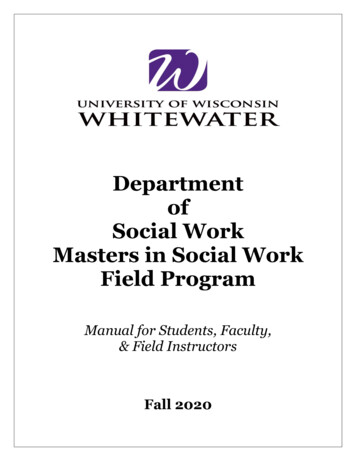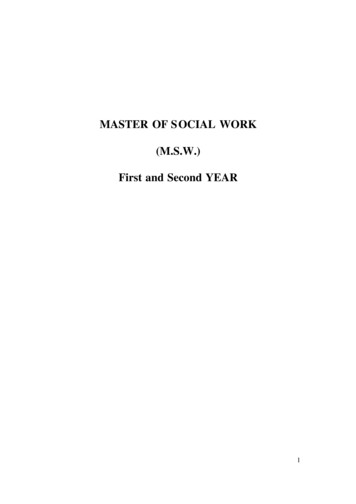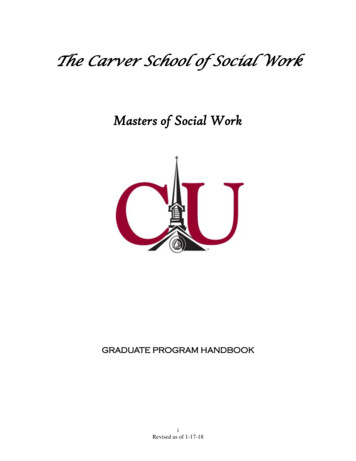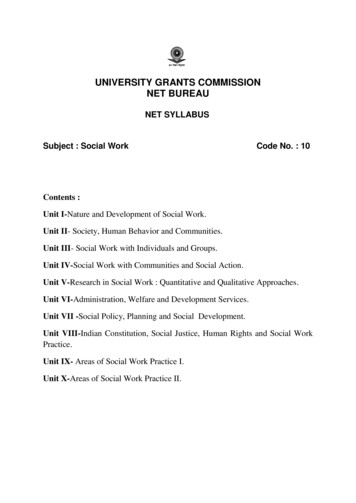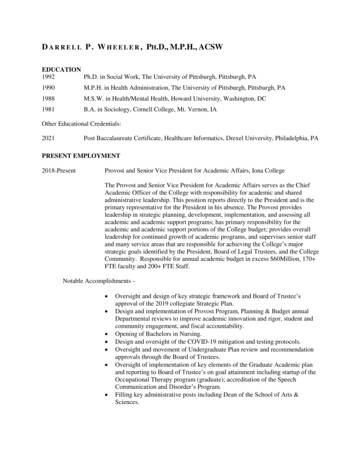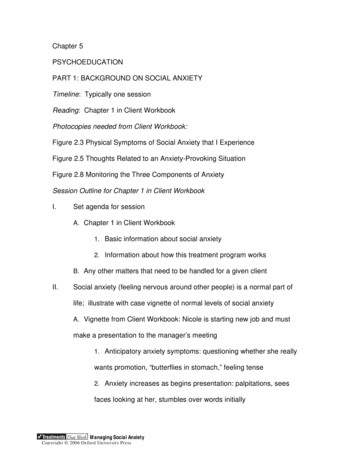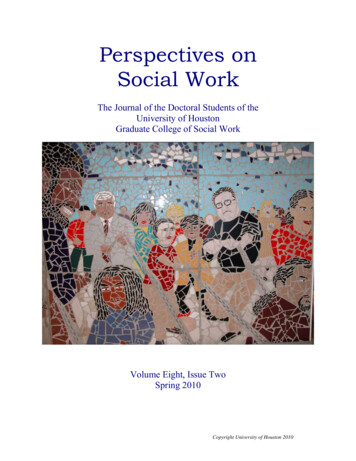
Transcription
Perspectives onSocial WorkThe Journal of the Doctoral Students of theUniversity of HoustonGraduate College of Social WorkVolume Eight, Issue TwoSpring 2010Copyright University of Houston 2010
Table of ContentsPerspectives on Social WorkEditors-in-ChiefMonique PappadisCorrine WalijarviEditorial BoardTawana CummingsElena DelavegaAmanda FordDavid FloresAlicia LaChappelleRhonda PatrickAlexis RoseMelissa TorresJosephine TittsworthFaculty SponsorMaxine EpsteinEditorial Policy:Perspectives on Social Work is apublication of the doctoral studentsof the University Of HoustonGraduate College Of Social Work.Submissions are selected by theEditors and edited with thestudent’s permission.Responsibility for the accuracy ofthe information contained restssolely with the individual authors.Views expressed within each articlebelong to the authors and do notnecessarily represent the views ofthe editors, the Graduate College ofSocial Work, or the University ofHouston. All inquiries andsubmissions should be directed to:Perspectives on Social WorkGraduate College of Social WorkUniversity of HoustonHouston, TX 77204-4492Final Letter from former Editor3From the Editors3CV Builder4Empowerment and Child Welfare ClientsRebecca G. Mirick, LICSWSimmons College7Complexity Theory as a Conceptual Construct for UnderstandingClient ChangeDana E. Prescott, JD, LMSWSimmons College11Termination of an Emotionally Abusive Relationship and Womenwith Social Resources: An Initial Exploration of a Social ProblemFiona Eisenberg, LCSWHunter College of CUNY16Reading Women’s Voices: Gendered Experiences of Drug Usein IndiaGayatri MoorthiUniversity of Illinois at Urbana-Champaign21Online Therapy: Do the Benefits Outweigh the Potential LegalRamifications?Penny Damaskos, LCSW, OSW-CYeshiva University25Identifying Stigma: The Road to Lung Cancer AdvocacyAnnemarie Conlon, ABD, MBA, MSWUniversity of Texas at Austin30Bookworm’s CornerBook Review: Clinical Data Mining: Integrating Practice andResearchReviewed by: Gary S. DeFraia, MSW, LCSWHunter College of CUNY35Book Review: Strength-Based Batterer Intervention: A NewParadigm in Ending Family ViolenceReviewed by: Ian G. DeGeerWilfrid Laurier University37Guidelines for Submissions39OrJournal@sw.uh.edu2 2010 University of Houston. All rights reserved.
Final Letter from former EditorAfter years of graduate studies, I will be obtaining my PhD in Summer 2010. As I move towardsthe next steps in my career, I would like to pause and express what Perspectives on Social Work hasmeant for my development as a scholar. This has been a wondrous journey, full of excitement, stress, joy,tears, and all other emotions in between. During this process, I have met amazing people, and I have hadthe opportunity to experience amazing phenomena. I remember the trepidation with which I approachedthe first article I reviewed. However, as time went by, I became more and more confident in my ability toperform this task well. This experience will serve me well in the future, both as a writer and as a reviewerfor the advancement of the profession of social work.If I had not had the experience with PSW, my doctoral education would have been so much thepoorer, and my development as a scholar would not have been as well rounded. I cannot express enoughgratitude to Dr. Maxine Weinman Epstein for the fabulous opportunity she affords the students at theGraduate College of Social Work at the University of Houston to learn to review articles and to produce ahigh quality journal. One of the best parts of my PhD studies was the time spent with Perspectives onSocial Work, both as a reviewer, and as an editor. I am extremely proud of the work we have done here,and humbled by the opportunity to be part of this amazing journal.Elena DelavegaFrom The EditorsWe are pleased to present the Spring 2010 Issue of Perspectives on Social Work. Submissions forthe issue reached record levels and represented a wide range of topics from a diverse array of doctoralstudents. We have seen the quality of submissions rise and our job has become more difficult as we havehad to select the few articles to be published from among so many interesting and worthy choices. Weappreciate the efforts of all doctoral students who have submitted manuscripts, as well as those who havecontributed to our peer review process by reading and commenting on the submissions. This journalwould not be possible without the contributions of the writers and reviewers as well as the members ofthe Editorial Board. We would like to welcome the newest members to the editorial board andcongratulate them on their efforts in the review process: Amanda Ford, Alicia LaChappelle, MelissaTorres, and Rhonda Patrick.Furthermore, we would like to give a special thanks to those who accepted our invitation toreview submissions for this issue. With your numerous personal commitments and deadlines, weappreciate your efforts in reviewing articles during a busy semester. The invited reviewers for this issueinclude: Roberta Leal, Grace Loudd, Gargi Bhowmick, Takeisha Plowden, Venus Tsui, Nadia Kalinchuk,and Darla Beaty. Outside reviewers are invaluable members of the review process and must beacknowledged for their support in Perspectives on Social Work. The invited outside reviewers for thisissue include: Scott Easton (University of Iowa), Kristina Webber (UNC at Chapel Hill), and MarvaAugustine (Indiana University).We thank you all for your dedication and hard work in making Perspectives on Social Work a success!Best regards,Corrine Walijarvi & Monique Pappadis3 2010 University of Houston. All rights reserved.
The CV BuilderUniversity of Houston, Graduate College of Social WorkPerspectives on Social Work congratulates the following doctoral students on theiraccomplishments during fall 2009 through spring/summer 2010.Darla Beaty will be an Assistant Professor in the School of Social Work at West Texas A&MUniversity after graduation and will start in August 2010.Venus Tsui has presented a poster at the 2010 Joint World Conference on Social Work andSocial Development: The Agenda in Hong Kong. She was awarded the Best Abstract Award forResearcher for her poster titled “Intimate partner abuse against men: A research agenda for anunderstudied and underserved population.” She has published and/or received acceptance for thepublication of the following articles:Tsui, V., & Cheung, M. (2011, in press). Chinese male victims in intimate partner violence: Examininghelp-seeking behaviors through a systems perspective. China Journal of Social Work.Tsui, V., Cheung, M., & Leung, P. (2010). Help-seeking among male victims of partner abuse: Men’s hardtimes. Journal of Community Psychology, 38(6), 769-780.Leung, P., Cheung, M., & Tsui, V. (2010, Accepted). Help-seeking behaviors among Chinese Americanswith depressive symptoms. Social Work.Venus Tsui and Ada Cheung presented a juried paper at the Society for the Social Work andResearch 14th Annual Conference (2010, January) in San Francisco, CA on “Linking depressivesymptoms to help-seeking preference among Pakistani Americans” with Monit Cheung andPatrick Leung.Elena Delavega translated into Spanish an article for The Catholic Worker and was elected asthe Delegate Assembly Diversity Representative from Texas (Position 6) for the NationalAssociation of Social Workers. She has presented at the 73rd Annual Meeting of the SouthernSociological Society (SSS) in Atlanta, GA and also at the 36th Annual Meeting and EducationalLeadership Conference of the Association of Gerontology in Higher Education (AGHE) in Reno,NV. She has been accepted for presentation at the Annual Program Meeting at CSWE inPortland, OR, the NASW/Texas 34th Annual State Conference in Houston, TX, and theGerontological Society of America’s 63rd Annual Meeting in New Orleans, LA. She haspublished the following articles:Cheung, M., Delavega, E., Castillo, I., & Walijarvi, C. (2010). Practical insights from interviews with daylaborers. Submitted to Journal of Ethnic & Cultural Diversity in Social Work, forthcoming.Bailey, J., & Delavega, E. (2010). Rules on The Hague and the Intercountry Adoption Act: Publiccomments and the state’s responsiveness. Journal of Policy Practice, forthcoming.Cheung, M., & Delavega, E. (2010, in press). Book review of Treatment of traumatized adults andchildren: Clinician's guide to evidence-based practice. Research on Social Work Practice.doi:10.1177/1049731510370038Monique R. Pappadis gave an oral presentation at the 2010 Joint World Conference on SocialWork and Social Development: The Agenda in Hong Kong. She was awarded the University ofHong Kong Student Award for Outstanding Abstract for her abstract titled “Perceivedenvironmental barriers of persons with traumatic brain injury.” She was recently awarded theUniversity of Houston’s Alpha Phi Honor Society Honorable Mention Award and the4 2010 University of Houston. All rights reserved.
International Education Fee Scholarship-Houston Junior Chamber of Commerce Scholarship(IEFS-HJCC). Along with Angelle Sander, Ph.D. and Margaret Struchen, Ph.D., she wasreceived the David Strauss, Ph.D. Memorial Award for outstanding poster presentation by theAmerican Congress of Rehabilitation Medicine Brain Injury Interdisciplinary Special InterestGroup (BI-ISIG) for their poster titled “Perceptions of community integration in an ethnicallydiverse sample” at the annual meeting of the ACRM-ASNR Joint Educational Conference inDenver, Colorado, in October 2009.In addition, Monique R. Pappadis was invited to give an oral presentation titled “A TBIeducation program for persons from diverse backgrounds” at the Community Integration ofPersons with Traumatic Brain Injury, Advances in Research and Implications for TreatmentConference in Houston, TX, in September 2009. She also presented along with A.M. Sander andM.A. Struchen the posters titled “Relationship of attitudinal barriers and community integrationto psychosocial adjustment to disability in persons with traumatic brain injury” and “Validity ofthe Acceptance of Disability Scale for persons with traumatic brain injury in an ethnicallydiverse sample” at the ACRM-ASNR Joint Education Conference in Denver, Colorado, inOctober 2009. She recently received notification that her abstract titled “Impact of traumaticbrain injury on quality of life and self-concept: Perspectives of survivors in an ethnically diversesample” was accepted for presentation at the 2010 ACRM-ASNR Joint Educational Conferencein Montreal, Quebec, Canada in October. She has published the following articles:Pappadis, M. R., Sander, A. M., Struchen, M. A., Leung, P., & Smith, D. W. (in press). Commonmisconceptions about traumatic brain injury (TBI). Journal of Head Trauma Rehabilitation.Sander, A. M., Pappadis, M. R., Clark, A. N., & Struchen, M. A. (in press). Perceptions of communityintegration in an ethnically diverse sample. Journal of Head Trauma Rehabilitation.Clark, A. N., Sander, A. M., Pappadis, M. R., Evans, G., Struchen, M. A., et al. (in press). Caregivercharacteristics and their relationship to health service utilization in minority patients with firstepisode stroke. NeuroRehabilitation.Sander, A. M., Clark, A. N., & Pappadis, M. R. (2010). What is community integration anyway?:Defining meaning following traumatic brain injury. Journal of Head Trauma Rehabilitation,25(2), 121-127.Sander, A. M., Pappadis, M. R., Davis, L. C., Clark, A. N., Evans, G., Struchen, M. A., et al. (2009).Relationship of race/ethnicity and income to community integration following traumatic braininjury: Investigation in a non-rehabilitation trauma sample. NeuroRehabilitation, 24(1), 15-27.Josephine Tittsworth was recently awarded the Dee McKellar Award by the HoustonTransgender Unity Committee on May 1, 2010. She also produced the Second Annual TexasTransgender Nondiscrimination Summit held at Rice University in Houston, Texas from July 2023, 2010, which received funding from the Hollyfield Foundation in Houston. She was invited tolecture along with A. Lev on “What social workers need to know about gender identity:Transgender, transsexual, and gender non-conforming experience” at the NASW SpecialtyPractice Sections CEU Teleconference on January 13, 2010. She has also taught the English4341: Queer Theory course during April 19-23, 2010 for Professor Maria C. Gonzalez, Ph.D. atthe University of Houston. She has presented “Creating Transgender-Inclusive College Policiesand Practices” (2010, February) at the Creating Change Conference in Dallas, TX with G. J.Beemyn and K. Stewart, sponsored by the National Gay and Lesbian Task Force. She receivedacceptance for presentation on “Transgendered Nondiscrimination Summit” (2010, September)with K. Stewart at the Southern Comfort Conference in Atlanta, GA. She has published thefollowing manuscript:5 2010 University of Houston. All rights reserved.
Erich, S., Tittsworth, J., & Kersten, A. S. (2010). An examination and comparison of transsexuals ofColor and their White counterparts regarding personal well-being and support networks. Journalof GLBT Family Studies, 6, (1), 25-39.David Flores was recently an Honoree at the University of Houston’s Graduate College ofSocial Work’s “Heroes Among Us” award ceremony and is the award recipient of the Universityof Houston’s Phi Alpha Honor Society Mu Lambda Chapter Scholarship and the MD AndersonSocial Work Fellow Scholarship for his extraordinary work. He has presented and/or receivedacceptance for presentation of the following oral presentations:Flores, D.V. & Torres, L.R. Challenges in Assessing Mental Health Issues in Latinos , Oral presentation tobe presented at the NASW/Texas 34th Annual State Conference, October 8-10, 2010, Houston,TX.Lopez, S., Torres, L.R., & Flores, D.V. Culturally Competent Practice with Hispanics: Challenges andOpportunities, faculty development presentation, to be presented at 56th Annual Program Meetingof the Council on Social Work Education, October 14-17, 2010, Portland, Oregon.Flores, D.V. Latino Perceptions and Barriers to Healthcare in the Southwest United States, Oralpresentation at the 14th Annual Society for Social Work Research Conference: A World ofPossibilities, January 14 - 17, 2010, San Francisco, CA.Flores, D.V. Hispanics Barriers to Healthcare Utilization and Healthcare Reform. Shaping Transitions: ASocial Work Perspective in Research, 6th Annual Doctorial Symposium, University of HoustonGraduate College of Social Work, March 4, 2010, Houston, Texas.Flores, D.V. Latinos and Cancer: Overcoming Challenges and Providing Effective Care. Invited oralpresentation, University of Texas MD Anderson Cancer Center, June 29, 2010, Houston, TX.Corrine Walijarvi presented a paper titled “Measuring grief: Difficulties and opportunities”along with A. Weiss at the 14th Annual Symposium of the National Alliance for GrievingChildren, which was held June 24-26, 2010 in Cleveland, Ohio. In addition, her abstract titled“Difficulties and implications of measuring abstract constructs in social work research: Theexample of grief” was accepted for oral presentation at the Sixth Annual Doctoral Social WorkStudent Research Symposium, which was held on March 4, 2010 by the Graduate College ofSocial Work at the University of Houston.6 2010 University of Houston. All rights reserved.
Empowerment and Child Welfare ClientsRebecca G. Mirick, LICSWSimmons CollegeEmpowerment is a key element of social work practice. The NASW Code of Ethics(NASW, 1999) begins with the statement “The primary mission of the social workprofession is to enhance human well-being and help meet the basic human needs of all people,with particular attention to the needs and empowerment of people who are vulnerable, oppressed,and living in poverty” (p. 1). Although the Code of Ethics clearly states an obligation on the partof social workers to empower their clients, it does not define this complex concept. A 1994article in the NASW journal Social Work does define it, saying that empowerment has two parts:(a) personal empowerment, which is similar to self-determination and recognizes the inherentuniqueness of each client, and (b) social empowerment, which acknowledges that individualscannot be separated from their environment and that people must have access to certain resourcesto be able to influence that environment (Cowger, 1994).The Code of Ethics does not explain how, or under what circumstances, empowermentshould occur. Although the implication is that empowerment should always be a goal of socialworkers, it does not discuss the circumstances in which the empowerment of a client might notbe beneficial, or where it is difficult to comprehend how the empowerment could take placewithin a disempowering system. There are several examples of situations like this. One is that ofa social worker who is working with a parent whose children are in the custody of the state.These parents are often working closely with the state’s child welfare services.A child welfare agency most frequently becomes involved with families due toallegations of abuse or neglect. When these allegations have been substantiated and children aretaken into state care, parents must work with child protective services (CPS) on a service plan.The parents must work on the goals highlighted on the service plan before the case will be closedor the children returned home. Recent national child welfare legislation has placed legal pressureon parents and caseworkers to accomplish this task within twelve months or determine anotherpermanency plan for the child, such as adoption or guardianship. Noncompliance with the goalsof the service plan, commonly defined as not attending mandated treatment, often leads to thechild remaining in state care (Atkinson & Butler, 1996; Jellinek et al., 1992).Clients often feel disempowered and powerless in their interactions with child welfareservices and feel like the power of CPS is unlimited (Diorio, 1992; Dumbrill, 2006). Parentswho are already experiencing oppression due to their race, gender, social class, education level,or lack of access to resources are at higher risk of being further disempowered when workingwith a government agency like child welfare services. Statistics show that more than half of thechildren involved with child welfare are non-white and the majority of families are affected bypoverty (Sedlak & Broahurst, 1996; U.S. Department of Health and Human Services,Administration on Children, Youth and Families, 2009).With this basic understanding of child welfare services and the parents they serve, theempowerment of parents appears to be a desired goal for this population. However, a deeperunderstanding of the child welfare system accesses the realization that this system does notreward empowerment. Expressions of empowerment, either personal or social, can be interpretedby the system as disrespectful or a demonstration that the parent does not place a high priority onregaining custody of the child (Reich, 2005). As a result, parents and families can experienceserious consequences from empowerment actions.7 2010 University of Houston. All rights reserved.
The child welfare system and empowermentAlthough child protection agencies ideally work collaboratively with parents andfamilies, research that has looked at the child welfare system in the United States suggests thatthe system responds more positively to deference and compliance than to engagement andempowerment (Reich, 2005; Smith, 2008). Deference to a child protection worker and to thesystem is understood as an expression of a parent’s commitment to regaining custody of the childand willingness and motivation to change. It is also seen as recognition that there is a problemand that the parent is seeking help with this acknowledged problem. Parents who attempt to beempowered or “stand up for themselves” are often labeled as non-compliant, angry or unwillingto change, and can be penalized for those actions, either through a delay in the child’s returnhome or through termination of their parental rights. Expressions of anger, even self-righteous,justified anger, can be seen as evidence of a parent’s loss of control or lack of desire to make thechanges necessary to regain custody of the child. Some parent who remain angry during theirinvolvement with child welfare services are never able to reunify with their children (Reich,2005).Compliance and deference, which can be seen as the antithesis of empowerment, aresurprisingly highly valued in the child welfare system. Some research shows that compliance isvalued even over behavioral change (Reich, 2005; Smith, 2008). Although, unsurprisingly,compliance with mandated treatment services is strongly correlated with family reunification(Atkinson & Butler, 1996; Jellinek et al., 1992); this relationship is stronger than might beexpected. Compliance influences the speed at which children are returned home even whencontrolling for continued substance use or the presence of another problem that led to the childbeing removed (Smith, 2003)The context of child welfare services leads to an ethical dilemma for social workers whoare working with parents who are receiving child welfare services: Should they empower clientswhen they are involved in a system that does not reward empowerment? While the Code ofEthics sets forth empowerment as a goal for social work clients, it does not address what actionto take in a context where empowerment is not appreciated or whether empowerment is alwaysan ethical clinical choice.What options does a clinician have?Social workers have several options for addressing empowerment with CPS involvedclients. These options involve making choices around how to acknowledge the power issues andlack of empowerment clients often experience in CPS work, as well as deciding whether toactively advocate for clients and change within the system.One option is to take a collaborative approach to work with clients, acknowledging thepower issues inherent in CPS involved work and addressing them both directly and throughtechniques designed to help mandated clients successfully engage in the work. Altman andGohagan (2009) suggest doing this through the framework of Reactance Theory, whichunderstands that people have predictable, normal responses to a loss of freedom. These responsesinclude specific behaviors, such as anger and defiance, which can lead to a client being labeledas resistant or non-compliant (Brehm, 1966; Rooney, 2009). Child welfare involvement isaccompanied by many such losses of freedom, such as the loss of custody of a child or therequirement to attend treatment services. Clinicians can apply techniques drawn from ReactanceTheory, such as being clear about the boundaries of the work and confidentiality, naming andclarifying power differentials, offering choices and highlighting the client’s right to self-8 2010 University of Houston. All rights reserved.
determination. All these can lead to successful collaborative work with clients. Althoughcollaborative work gives some power back to the client, ultimately compliance with a mandate toattend treatment, and work on specific goals from the client’s service plan will probably benecessary for the client to quickly regain custody of the child.A second approach reflects a Freirian analysis of the individual problem (Freire, 1993).Paulo Freire, a Brazilian educator and consciousness raiser, believed that the role of socialworkers lay in helping clients gain an awareness of the larger issues of oppression and power thatmay explain the etiology of individual problems. Through this awareness and knowledge, hebelieved that change could occur (Carroll & Minkler, 2000). Although clients may be penalizedfor seeking empowerment within the CPS system, social workers can discuss with clients issuesof power, compliance, and oppression within this system and increase awareness of the lack ofappreciation for empowerment. Increasing critical consciousness, as Freire recommends, andhaving an honest discussion about the choices available to a client and the possible consequencesof those choices can be a personal empowerment approach, placing priority on the client’s rightto self-determination. This approach acknowledges the client’s powerlessness within the systembut also highlights that her response to the system is her choice—and she may choose to gainpower by showing deference and continuing to appear powerless.A third empowerment approach focuses on social workers themselves advocating forsystemic change within the child welfare system. This reflects the concept of socialempowerment, that individuals are closely intertwined with their environment and must haveaccess to necessary resources, and recognizes the power and privilege inherent in the position ofsocial worker versus client (Weinberg, 2006). Several changes in policy and agency culturewould support increased parental empowerment in a population whose demographics suggestmany are already disempowered. An effort to educate direct service child welfare workers aboutpsychological reactance and resistance would help workers develop alternative, less negativeexplanations for parental noncompliance and lack of deference and be able to better tolerate andunderstand empowered parents. A push towards more collaborative work with families is alreadyhappening at the administration level of some states’ child welfare agencies. More education fordirect service workers around how to work collaboratively with parents would benefit bothparents and workers. Changes that bring child welfare practices more in line with the Code ofEthics, which identifies dignity and worth of the person and the importance of humanrelationships as two of social work’s core values, would also be valuable to both families andworkers.Making these changes within child welfare services would allow the institutional cultureto better match the values set forth in the Code of Ethics: service, social justice, dignity andworth of the person, importance of human relationships, integrity and competence. Thesechanges would not cause children to be removed less often or returned home more quickly but byacknowledging parents’ own worth, treating them with respect and dignity and allowing them toadvocate for themselves in positive ways, the relationship between child welfare services andparents could be strengthened and changed. In a child welfare agency with a culture whichwelcomes empowered parents, social workers working with these clients would be able to workwith them towards both personal and social empowerment without being concerned about thepotential cost of that work to the parent and to the child.9 2010 University of Houston. All rights reserved.
ConclusionSocial workers face difficult decisions when working with parents who are involved withchild welfare services. Although the NASW Code of Ethics requires that social workers worktowards empowering clients, especially those who have experienced oppression due to theirminority status, the child welfare system rewards deference and compliance, not empowerment.Social workers must seriously consider the possible consequences of empowerment for theirclients before acting and explore ways to work towards empowerment within this system.ReferencesAltman, J., & Gohagan, D. (2009). Work with involuntary clients in child welfare settings. In R. H. Rooney (Ed.),Strategies for work with involuntary clients (2nd ed., pp. 224-347). New York: Columbia University Press.Atkinson, L., & Butler, S. (1996). Court-ordered assessment: Impact of maternal noncompliance in childmaltreatment cases. Child Abuse and Neglect, 20, 185-190.Brehm, J. W. (1966). A theory of psychological reactance. New York: Academic Press.Carroll, J., & Minkler, M. (2000). Freire’s message for social workers: Looking back, looking ahead. Journal ofCommunity Practice, 8, 21-36.Cowger, C. D. (1994). Assessing client strengths: Clinical assessment for client empowerment. Social Work, 39,262-269.Diorio, W. D. (1992). Parental perceptions of the authority of public child welfare workers. Families in Society, 73,222-235.Dumbrill, G. (2006). Parental experience of child protection intervention: A qualitative study. Child Abuse andNeglect, 30, 27-37.Freire, P. (1993). Pedagogy of the oppressed (2nd ed.). New York: The Continuum International Publishing Group,Inc.Jellinek, M. S., Murphy, M., Poitrast, F., Quinn, D., Bishop, S. J., & Goshko, M. (1992). Serious child maltreatmentin Massachusetts: The course of 206 children through the courts. Child Abuse and Neglect, 16, 179-185.National Association of Social Workers. (1999). Code of ethics of the National Association of Social Workers.Washington, DC: NASW Press.Reich, J. A. (2005). Fixing families, parents, power and the child welfare system. New York: Rutledge.Rooney, G. D. (2009). Oppression and involuntary status. In R. H. Rooney (Ed.), Strategies for work withinvoluntary clients (2nd ed., pp. 349-387). New York: Columbia University Press.Sedlak, A. J., & Broahurst, D. D. (1996). Third national incidence study of child abuse and neglect. Washington,DC: U.S. Department of Health and Human Services.Smith, B. D. (2003). How parental drug use and drug treatment compliance relate to family reunification. ChildWelfare, 82(3), 335-365.Smith, B. D. (2008). Child welfare service plan compliance: Perceptions of parents and caseworkers. Families inSociety, 89(4), 521-532.U.S. Department of Health and Human Services, Administration on Children, Youth and Families. (2009). Childmaltreatment 2007. Washington, D.C.: U.S. Government Printing Office.Weinberg, M. (2006). Pregnant with possibility: The paradoxes of “Help” as anti-oppression and discipline with ayoung single mother. Families in Society, 87, 161-169.10 2010 University of Houston. All rights reserved.
Complexity Theory as a Conceptual Constructfor Understanding Client ChangeDana E. Prescott, JD, LMS
Annemarie Conlon, ABD, MBA, MSW University of Texas at Austin Bookworm's Corner Book Review: Clinical Data Mining: Integrating Practice and 35 Research Reviewed by: Gary S. DeFraia, MSW, LCSW Hunter College of CUNY Book Review: Strength-Based Batterer Intervention: A New 37 Paradigm in Ending Family Violence Reviewed by: Ian G. DeGeer

